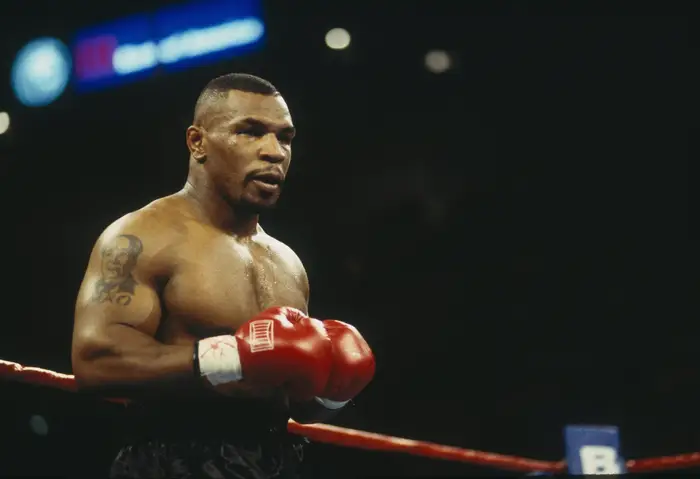
Mike Tyson, the name synonymous with power and ferocity in the boxing ring, has lived a life of remarkable highs and profound lows. As one of the most iconic and controversial figures in the sport’s history, Tyson’s financial journey reflects both his success in the ring and the challenges he has faced off it.
In this blog post, we will delve into Mike Tyson’s net worth, exploring the sources of his wealth, the financial ups and downs he has experienced, and what his story reveals about the volatile world of professional sports.

The Rise of Mike Tyson
Born on June 30, 1966, in Brooklyn, New York, Mike Tyson’s rise to prominence in the boxing world was meteoric. Known for his explosive power and aggressive fighting style, Tyson became the youngest heavyweight champion in boxing history at the age of 20.
His dominance in the ring was unparalleled, earning him the nickname “Iron Mike” and solidifying his place as one of the greatest boxers of all time. Tyson’s early career was marked by a series of impressive victories and record-breaking performances.
His ability to end fights quickly and decisively made him a sensation and a highly sought-after athlete. His reign as heavyweight champion, marked by victories over notable opponents such as Trevor Berbick, James “Bonecrusher” Smith, and Larry Holmes, established him as a dominant force in boxing.
The Financial Peak
At his peak, Mike Tyson’s financial success matched his boxing prowess. During the late 1980s and early 1990s, Tyson was one of the highest-paid athletes in the world. His income came from a combination of boxing purses, endorsements, and lucrative sponsorships.
Boxing Purses
Tyson’s boxing purses during his prime were astronomical. His fights were among the most anticipated events in sports, commanding huge pay-per-view revenues and gate receipts. Tyson’s earnings from these bouts were substantial, with some of his fights bringing in tens of millions of dollars.
For example, his fight against Michael Spinks in 1988 earned him approximately $20 million, a significant sum at the time.
Endorsements and Sponsorships
In addition to his fight purses, Tyson’s marketability led to numerous endorsement deals. He was the face of several high-profile brands, including Nike and Pepsi. His charismatic and often controversial persona made him a valuable asset for companies looking to leverage his fame. These endorsements provided Tyson with additional income and expanded his financial portfolio.
The Financial Decline
Despite his financial success, Tyson’s story is also one of significant financial mismanagement and personal struggles. The latter part of the 1990s and early 2000s saw Tyson’s net worth decline dramatically, reflecting the impact of his turbulent personal life and legal troubles.
Legal Issues and Incarceration
Tyson’s career took a dramatic turn in 1992 when he was convicted of rape and sentenced to six years in prison. The incarceration not only impacted his boxing career but also had severe financial repercussions. Tyson’s absence from the ring meant a loss of income and the additional costs associated with legal fees and maintaining his lifestyle.
Financial Mismanagement
Tyson’s extravagant lifestyle contributed to his financial woes. Known for his lavish spending, Tyson purchased multiple luxury homes, expensive cars, and other high-end items. His financial management was often criticized, and he was reportedly advised by a string of financial advisors who failed to curb his spending habits. By the early 2000s, Tyson faced significant financial difficulties, including bankruptcy.
Bankruptcy
In 2003, Tyson filed for bankruptcy, claiming debts of over $27 million. Despite having earned hundreds of millions of dollars throughout his career, Tyson’s financial mismanagement and legal troubles had taken a toll. The bankruptcy proceedings were a stark reminder of the financial challenges that can accompany high earnings and fame.
The Comeback and Current Net Worth
In the years following his bankruptcy, Tyson made efforts to rebuild his financial standing. His comeback included a combination of ventures aimed at capitalizing on his fame and expertise.
Boxing Comebacks and Exhibitions
Tyson’s return to the ring included a series of exhibition matches, such as his 2020 bout against Roy Jones Jr., which generated significant interest and revenue. While these matches were not for official titles, they demonstrated Tyson’s enduring appeal and provided him with an opportunity to earn money from the sport that made him famous across the world.
Media Ventures and Endorsements
Tyson has also ventured into various media projects, including acting, podcasting, and motivational speaking. His podcast, “Hotboxin’ with Mike Tyson”, has gained popularity and contributed to his income. Tyson’s ability to reinvent himself and engage with audiences through media platforms has played a role in his financial recovery.
Cannabis Industry
One of Tyson’s notable ventures in recent years is his involvement in the cannabis industry. Tyson’s company, Tyson Ranch, focuses on cannabis cultivation and products. The growing acceptance of cannabis and Tyson’s investment in the industry have provided him with a new revenue stream and demonstrated his adaptability in a changing market.
Estimating Mike Tyson’s Net Worth
As of 2024, estimates of Mike Tyson’s net worth vary but generally fall within the range of $10 million to $15 million. This figure reflects his efforts to rebuild his financial standing after years of significant financial decline.
Income from Boxing and Exhibitions
Tyson’s income from boxing exhibitions and related activities contributes to his current net worth. While not as lucrative as his prime years, these earnings help maintain his financial stability.
Media and Endorsements
Tyson’s media ventures, including his podcast and appearances, provide a steady source of income. His continued relevance in the public eye helps secure endorsement deals and other financial opportunities.
Cannabis Investments
Tyson’s investment in the cannabis industry has proven to be a successful venture. The growth of this industry and Tyson’s strategic involvement have contributed positively to his financial portfolio.
The Legacy of Mike Tyson
Mike Tyson’s financial journey is a testament to the volatile nature of fame and fortune. His story is one of remarkable success, followed by significant challenges, and ultimately a partial comeback. Tyson’s impact on boxing and popular culture is undeniable, and his ability to adapt and find new sources of income reflects his resilience and enduring appeal.
Tyson’s financial legacy serves as a reminder of the importance of financial management and the potential consequences of personal and professional challenges. His life and career offer valuable lessons about handling success, navigating adversity, and leveraging one’s skills and fame for financial stability.
Conclusion
Mike Tyson’s net worth is a reflection of a career marked by extraordinary achievements and profound struggles. From his peak as one of the highest-paid athletes to his financial decline and subsequent recovery, Tyson’s financial story is as dramatic as his boxing career.
As he continues to engage with audiences through media, cannabis ventures, and public appearances, Tyson’s net worth represents not just his financial success but also his resilience and adaptability. Despite the trials he has faced, Mike Tyson’s legacy as a boxing legend endures, and his financial journey serves as a compelling chapter in the broader narrative of sports and fame.







